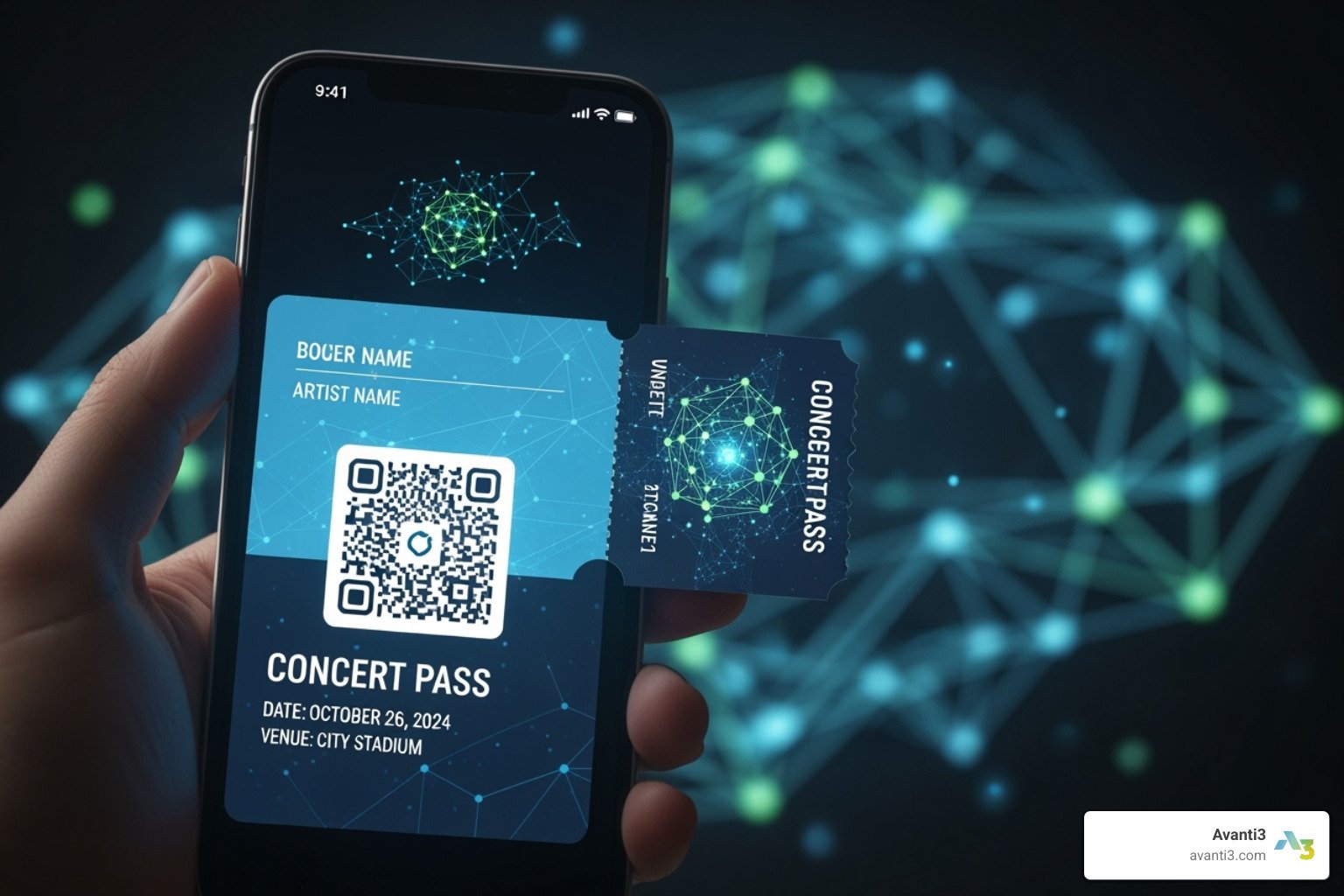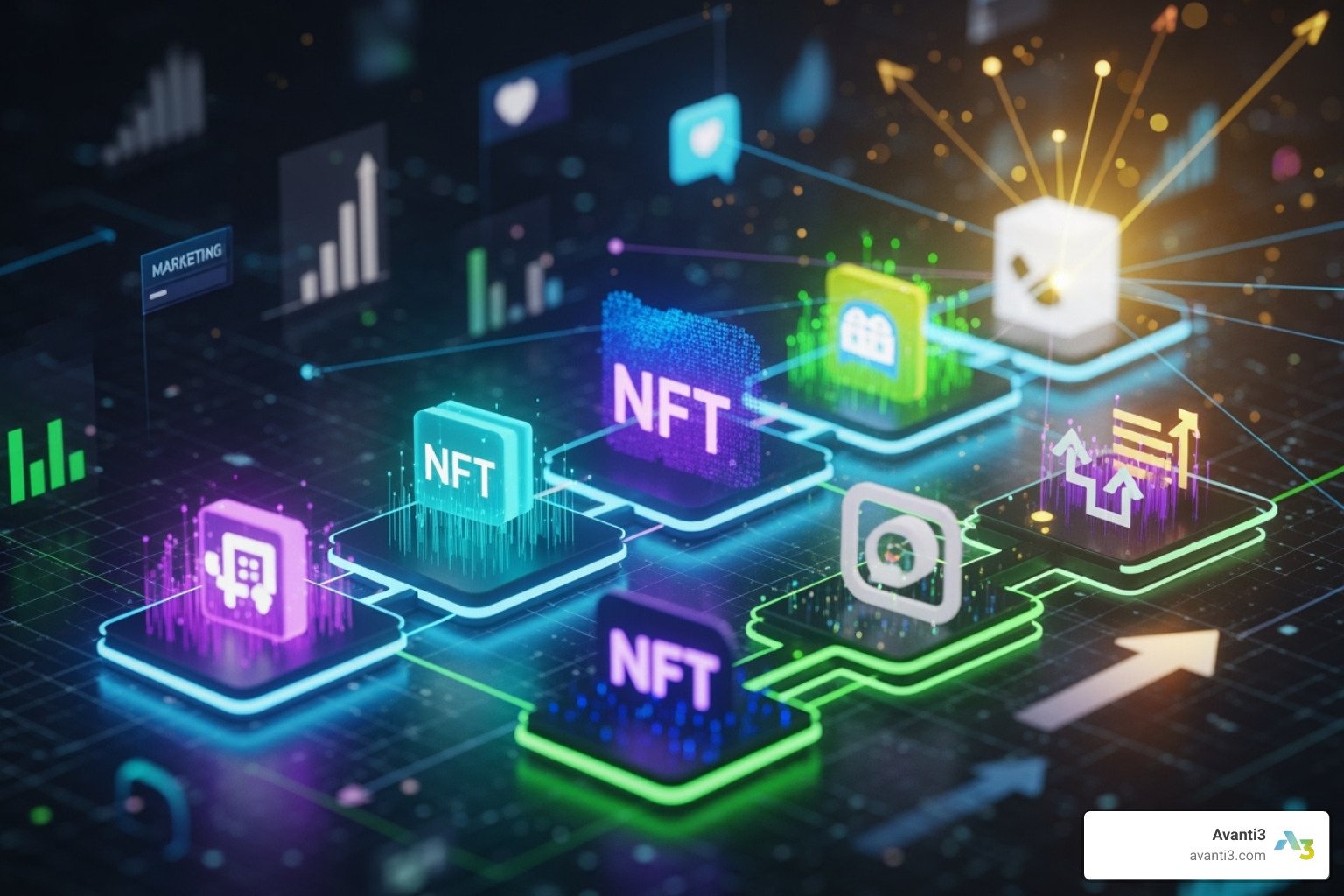Blockchain based ticketing system: 2025’s Ultimate Fix
Why Traditional Ticketing is Ripe for Disruption
A blockchain based ticketing system offers a approach to event ticketing that addresses the major pain points of traditional systems through secure, transparent, and programmable digital tickets.
Key Benefits of Blockchain Ticketing:
- Security: NFT tickets eliminate counterfeiting through unique digital assets
- Transparency: All transactions recorded on immutable blockchain ledger
- Anti-Scalping: Smart contracts can cap resale prices and prevent bot purchases
- Artist Revenue: Creators earn royalties on every secondary market sale
- Fan Experience: Tickets become collectible digital assets with programmable features
- Lower Fees: Reduced intermediary costs compared to traditional platforms
The current ticketing industry is plagued by serious problems that frustrate fans and hurt creators. Ticket scalping drives prices through the roof. Counterfeit tickets leave fans stranded at venue doors. Opaque service fees add unexpected costs. Meanwhile, artists miss out on secondary market profits entirely.
The numbers tell the story – the global event ticketing market is projected to reach $100 billion by 2027. Yet this massive industry still relies on outdated systems that benefit middlemen more than creators or fans.
As an entrepreneur experienced in innovative technology, I’ve seen how a blockchain based ticketing system can revolutionize fan engagement and create new revenue streams for creators. My work scaling countless ventures has shown me that execution is key when adopting breakthrough solutions.
Related content about blockchain based ticketing system:
The Core Mechanics of a Blockchain Based Ticketing System
Imagine your concert ticket is no longer just paper or a QR code. A blockchain based ticketing system transforms it into a unique digital asset with superpowers, using NFTs and smart contracts to create something revolutionary.
At its core, a blockchain based ticketing system uses NFTs (Non-Fungible Tokens) as tickets. Think of NFTs as unique digital fingerprints, impossible to copy. When your ticket is an NFT, it’s a one-of-a-kind digital key that can’t be counterfeited.
Smart contracts are the real game-changers here. These are basically computer programs that automatically follow rules without needing humans to enforce them. They bring transparency because every transaction is recorded where everyone can see it. They provide security through blockchain’s tamper-proof nature. And they offer immutability – once something is recorded, it can’t be changed or deleted.
The decentralization aspect means no single company controls everything. Instead, the system runs across many computers, making it incredibly reliable and fair. This eliminates those frustrating situations where one platform crashes and thousands of fans lose their chance to buy tickets.
For creators looking to explore similar digital asset opportunities, our insights on NFT Digital Art Sales show how these technologies are changing creative industries.
How NFTs and Smart Contracts Create Secure, Programmable Tickets
Worried about fake tickets? With NFTs following the ERC-721 standard, that’s no longer an issue. Each ticket becomes a unique digital asset that’s impossible to duplicate, like giving it its own DNA.
The blockchain creates a tamper-proof ownership record. When you buy a ticket, your ownership is permanently recorded. Anyone can verify you’re the real owner by checking the verifiable history on the blockchain, eliminating the counterfeit ticket problem that costs fans millions annually.
But here’s where it gets exciting – these tickets are programmable. Smart contracts let us build incredible features right into the ticket itself. Automated royalty payments mean artists earn money every time someone resells their ticket. No more missing out on secondary market profits!
Dynamic pricing helps keep tickets affordable by adjusting costs based on real demand, not artificial scarcity created by bots. The access control features can grant special perks – maybe your ticket open ups exclusive content or gives you early access to future events.
These programmable rules turn a simple entry pass into a powerful tool that benefits everyone in the ecosystem. The technical framework behind this is fascinating – you can dive deeper into A framework for electronic tickets based on smart contract to see how it all works.
For those interested in how blockchain ensures authenticity in digital assets, our guide on Blockchain Art Authentication explores similar verification principles.
Opening Value: Combating Scalping and Enhancing Fan Experience
Scalpers have plagued live events for too long. A blockchain based ticketing system provides the tools to fight back. Smart contracts can enforce capped resale prices, preventing outrageous markups and making events more affordable for fans.
Artist royalties on secondary sales create a win-win situation. When someone resells a ticket, the artist automatically gets a cut. This isn’t just fair – it creates new revenue streams that help artists thrive in today’s challenging music industry.
Bot prevention becomes much easier when every transaction is recorded on the blockchain. We can spot and stop suspicious buying patterns before scalpers clean out the venue. This means real fans get a fair shot at tickets.
But the benefits go way beyond anti-scalping. True ownership for attendees means your ticket can become a digital collectible after the event. Imagine your ticket changing into unique artwork commemorating that amazing show you attended.
Direct fan communication through blockchain enables artists to send exclusive content, special offers, or even surprise perks directly to ticket holders. This creates deeper connections and builds stronger fan communities.
Our work in Digital Fan Engagement and Community Loyalty Programs shows how these technologies are revolutionizing the relationship between creators and their audiences.
The Ticketing Lifecycle on a blockchain based ticketing system: A Step-by-Step Workflow
Let’s walk through the powerful yet simple workflow of a blockchain based ticketing system.
Event Creation by Organizer kicks things off. The organizer sets up all the event details – date, venue, ticket types, pricing, and special rules like resale caps. All this information gets encoded into a smart contract that becomes the foundation for everything that follows.
Ticket Minting as NFTs comes next. The system creates unique digital tickets on the blockchain. Each ticket is completely distinct, making counterfeiting impossible. Think of it as printing money, but each bill has its own unique serial number that can’t be copied.
Secure Purchase & Transfer is straightforward. Fans can pay with credit cards—no crypto knowledge needed. Ownership transfer is instant and recorded permanently on the blockchain. Gifting a ticket to a friend is a simple, secure, and verifiable transfer.
QR Code Validation at Venue happens on event day. Your phone displays a QR code that venue staff scan. The system instantly checks the blockchain to confirm your ticket is real and belongs to you. Even if the venue’s internet is spotty, smart systems can verify tickets and sync up later.
Post-Event Change into a Digital Collectible is where the magic continues. After the show, your ticket can transform into a special digital souvenir. Maybe it becomes unique artwork, open ups exclusive content, or grants access to a fan community. Your ticket becomes a lasting memory instead of trash.
This entire process creates value at every step, turning a simple transaction into an ongoing relationship. Our approach to Digital Reward System explores how these lasting connections benefit both creators and fans.
Practical Considerations and the Future of Event Ticketing

While the potential of a blockchain based ticketing system is truly exciting, the real world demands practical solutions to some pretty complex challenges. Anyone who’s worked with blockchain technology knows about the famous scalability trilemma – that tricky balance between making systems decentralized, secure, and fast all at the same time. It’s like trying to have your cake and eat it too, but the good news is we’re getting closer every day.
The truth is, for blockchain ticketing to really take off, we need systems that feel just as smooth as buying tickets on any traditional platform. Nobody wants to fumble through complicated crypto wallets just to see their favorite band. That’s why user experience and interoperability are absolutely crucial – different systems need to work together seamlessly, creating an ecosystem that just makes sense for everyone involved.
At Avanti3, we’ve seen how important it is to build Web3 Platform Solutions that actually solve real problems instead of creating new ones. The key is making the technology invisible to users while delivering all those amazing benefits we’ve been talking about.
Implementation Choices: L2s, Data Storage, and Cost-Effectiveness
When you’re building a blockchain based ticketing system, one of the biggest decisions you’ll face is choosing between public and private blockchains. Public chains like Ethereum offer something really special – complete transparency where anyone can verify what’s happening, plus true decentralization that prevents any single company from controlling everything. The downside? They can be slower and more expensive because of those pesky gas fees.
Private chains flip the script – they’re faster and cheaper but give up some of that beautiful decentralization. For ticketing that needs to reach millions of fans, we believe the transparency and trust of public chains usually win out. After all, nobody wants to get locked into another centralized platform that could change the rules on a whim.
Here’s where Layer 2 solutions become absolute game-changers. These clever systems, especially rollups, process transactions off the main Ethereum chain and then batch them together. The result? Instead of paying $4 for a transaction on Ethereum, you might pay just $0.20 on a Layer 2 like Arbitrum. That’s the difference between blockchain ticketing being a cool experiment and a real solution for everyday events.
There are two main flavors of rollups worth knowing about. Optimistic rollups like Arbitrum assume transactions are legitimate and give people time to challenge them if something’s wrong. ZK-rollups use fancy cryptographic proofs to verify everything instantly. Each has its place depending on whether you need speed or absolute certainty. If you want to dive deeper into how these work, An overview of rollups breaks it down beautifully.
Smart data storage strategies make all the difference too. Critical information like who owns which ticket and what the resale rules are absolutely belongs on-chain where it’s permanent and secure. But things like event photos, detailed descriptions, or fancy NFT artwork? Those can live off-chain using systems like IPFS or traditional cloud storage. This hybrid approach keeps costs reasonable while maintaining the security where it matters most.
Key challenges of a blockchain based ticketing system and How to Solve Them
Let’s be honest about the challenges – every technology has growing pains, and blockchain ticketing is no exception. But here’s the thing: most of these problems already have pretty neat solutions.
Gas fees probably top everyone’s worry list. When Ethereum gets busy, transaction costs can make buying a $20 ticket feel pretty silly. But remember those Layer 2 solutions we talked about? They’re specifically designed to solve this exact problem. By moving most of the heavy lifting off the main chain, they make blockchain ticketing economically viable even for smaller events.
Then there’s the very real challenge of network connectivity at venues. Picture this: 50,000 people trying to validate their tickets at the same time in a stadium where the Wi-Fi is already struggling. Not exactly a recipe for success! The solution involves building smart offline verification systems that can work even when connectivity is spotty, then sync everything up once a stable connection returns.
User adoption presents another interesting puzzle. Most people aren’t crypto experts, and they shouldn’t need to become one just to buy concert tickets. The answer lies in creating user-friendly interfaces that hide all the blockchain complexity behind familiar experiences. Think integrated wallets that work like any other app, or even custodial solutions where the platform handles the technical stuff while users just click “buy ticket.”
Perhaps most importantly, fiat gateways are absolutely essential for mainstream adoption. The vast majority of people still pay with credit cards, not cryptocurrency. A successful blockchain based ticketing system needs to let users pay with traditional methods while seamlessly handling the crypto conversion behind the scenes. It’s about meeting people where they are, not forcing them to learn entirely new payment systems.
The goal isn’t to make everyone a blockchain expert – it’s to give them all the benefits without any of the complexity. That’s the philosophy we bring to everything we build, including our comprehensive Tools for Building a Community.
Conclusion: The New Standard for Digital Engagement
We’re witnessing something pretty special – the change of event ticketing from a frustrating necessity into an exciting part of the fan experience. A blockchain based ticketing system isn’t just fixing old problems; it’s creating entirely new possibilities for how artists, organizers, and fans connect with each other.
The future of fan experiences goes way beyond just getting through the door. We’re talking about tickets that become treasured digital collectibles, direct channels for artists to communicate with their biggest supporters, and collaborative ecosystems where everyone benefits. When artists earn royalties from ticket resales and fans get exclusive access to unique experiences, everybody wins.
The contrast with traditional systems really tells the story. Where old-school ticketing offers high fees and limited security, blockchain brings programmable artist royalties and tamper-proof authenticity. Instead of unregulated secondary markets full of scalpers, we get smart contract regulation with capped prices. Rather than opaque processes, fans enjoy full transaction transparency on an immutable ledger. And perhaps most excitingly, tickets transform from simple entry passes into collectible digital assets with dynamic features and ongoing value.
| Feature | Traditional Ticketing | Blockchain Ticketing |
|---|---|---|
| Security | Prone to counterfeits, fraud | NFT-backed, tamper-proof, verifiable authenticity |
| Fees | High, opaque service fees, often no artist cut from resales | Lower transaction fees (especially with L2), programmable artist royalties |
| Resale Control | Unregulated secondary markets, rampant scalping | Smart contract regulated, capped prices, bot prevention |
| Transparency | Opaque processes, hidden data | Full transaction history on immutable ledger |
| Fan Experience | Entry pass, limited post-event value | Collectible digital asset, dynamic features, direct engagement |
At Avanti3, we’re not just observers of this revolution – we’re actively building it. We empower creators and brands with cutting-edge technologies like NFTs, blockchain, AR/VR, and AI, creating the customizable engagement tools and fintech solutions that make all of this possible. Our focus on unique digital experiences, robust reward systems, and vibrant community building is redefining what it means to connect artists with their audiences.
The future of events is decentralized, transparent, and incredibly exciting. It’s a future where technology serves creativity instead of constraining it, where fans become true stakeholders in the experiences they love. Come Explore our Web3 Creator Platforms and see how we’re making this vision a reality, one innovative solution at a time.







